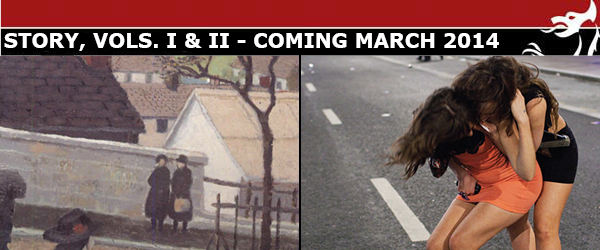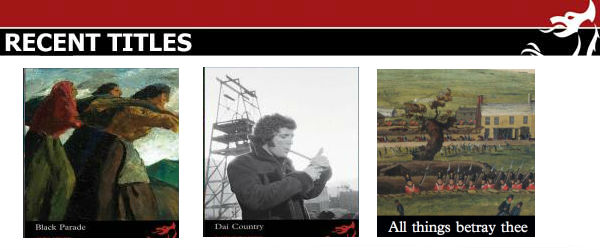31 Stories in May at Hay!: Day 24 - 'And a Spoonful of Grief to Taste' by Gwyn Thomas
Every day throughout May, you will be able to visit the Library of Wales website to download your free story, drawn from Story, vols I and II - a collection boasting the finest Welsh short fiction ever written and featuring some of the most talented literary names from both past and present, including the legendary Dylan Thomas and the award-winning Rachel Trezise, as well as read all about the chosen author.
Day 24: 'And a Spoonful of Grief to Taste' by Gwyn Thomas
(Taken from Where Did I Put My Pity? Folk Tales from the Modern Welsh, 1946)
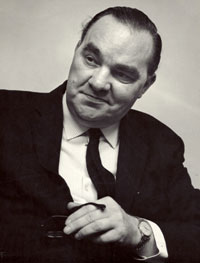
Gwyn Thomas was born in 1913 in the Rhondda Valley. He studied Spanish at Oxford and spent time in Spain during the early 1930s. He obtained part-time lecturing jobs across England before deciding to become a schoolteacher in Wales. He retired from that profession in 1962 to work full-time as a writer and broadcaster. He wrote extensively across several genres including essays, short stories, novels and plays, and was widely translated. His fictional works include The Dark Philosophers (1946) and All Things Betray Thee (1949), the drama The Keep (1962) and an autobiography, A Few Selected Exits(1968). Gwyn Thomas was given the Honour for Lifetime Achievement by Arts Council Wales in 1976. He died in 1981.
You can download the story in PDF format here. (If download does not start, then right click the link and select 'Save link as'.)
Selected bibliography
All Things Betray Thee (Library of Wales, 2011)
The Alone to the Alone (Library of Wales, 2008)
The Dark Philosophers (Library of Wales, 2005)

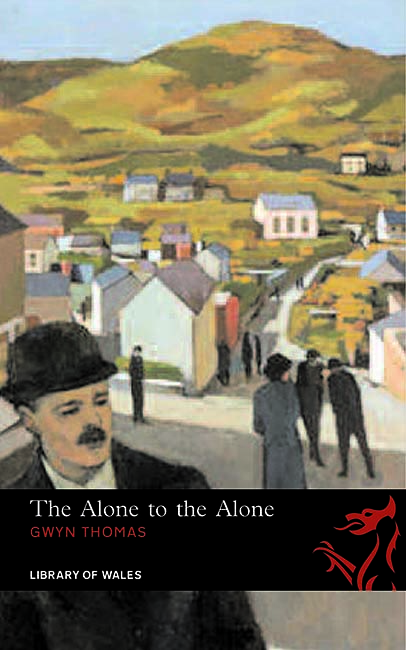
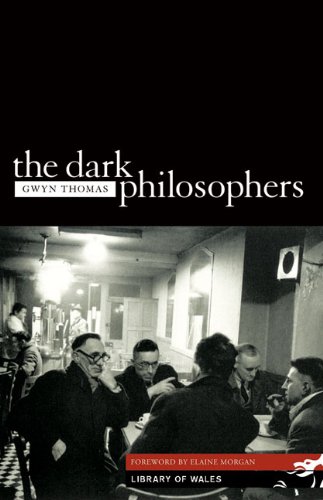
Contributed to
Story I (anthology) (Library of Wales, 2014)
Story II (anthology) (Library of Wales, 2014)

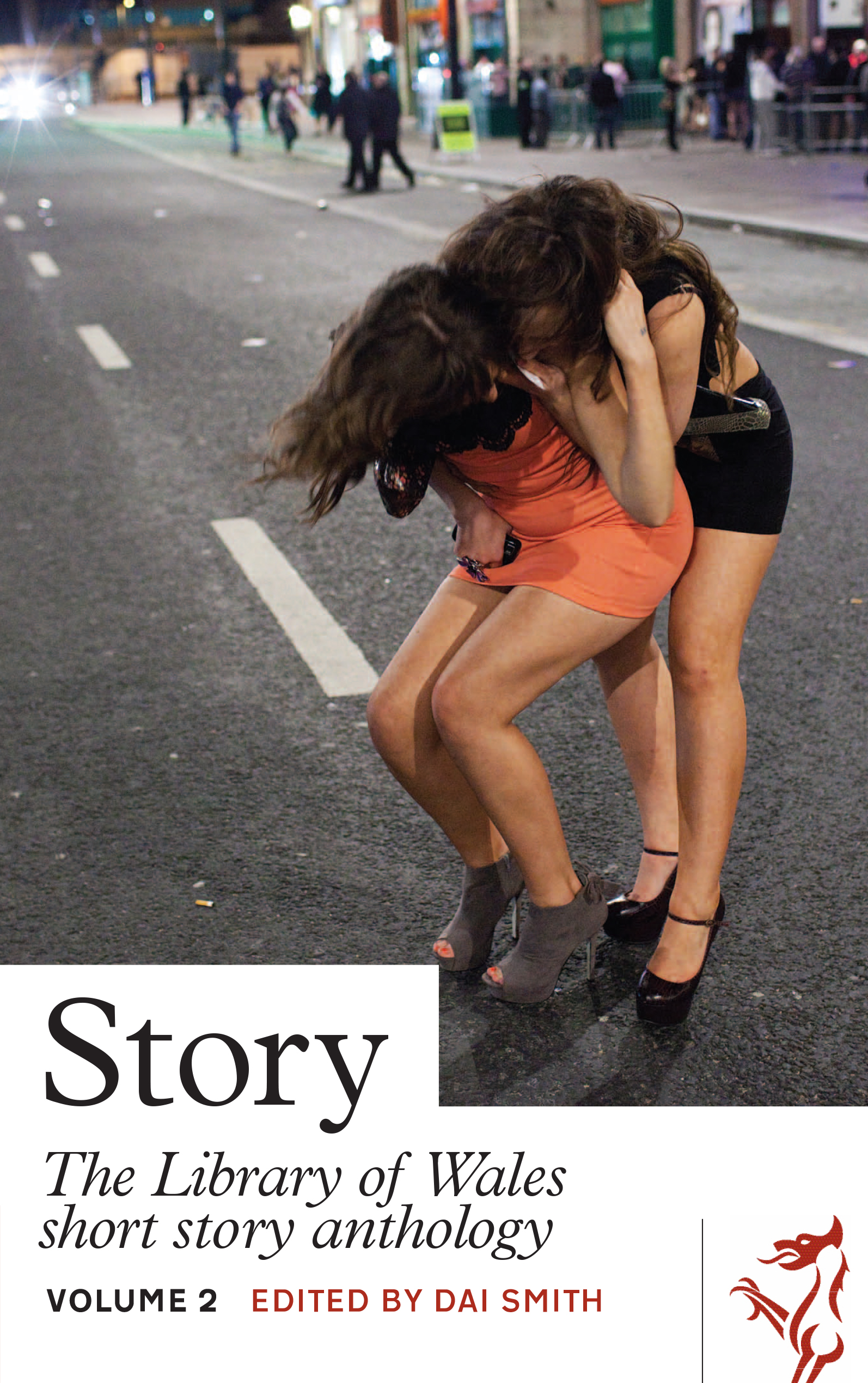
31 Stories in May at Hay!: Day 23 - 'The Last Jumpshot' by Leonora Brito
Every day throughout May, you will be able to visit the Library of Wales website to download your free story, drawn from Story, vols I and II - a collection boasting the finest Welsh short fiction ever written and featuring some of the most talented literary names from both past and present, including the legendary Dylan Thomas and the award-winning Rachel Trezise, as well as read all about the chosen author.
Day 23: 'The Last Jumpshot' by Leonora Brito
(Taken from Urban Welsh: New Welsh Short Fiction, 2005)
Leonora Brito was born in Cardiff. She studied law and history at Cardiff University. Her story ‘Dat’s Love’ won her the 1991 Rhys Davies Short Story Competition. She also wrote for radio and television, providing a unique insight into Afro-Caribbean Welsh society, largely unrepresented in Welsh writing until her work appeared. She published one collection of stories, Dat’s Love, in 1995. She died in 2007.
You can download the story in PDF format here. (If download does not start, then right click the link and select 'Save link as'.)
Selected bibliography
Contributed to
Story II (anthology) (Library of Wales, 2014)
Urban Welsh: New Welsh Fiction (Parthian, 2005)


31 Stories in May at Hay!: Day 22 - ' A Bed of Feathers ' by Rhys Davies
Every day throughout May, you will be able to visit the Library of Wales website to download your free story, drawn from Story, vols I and II - a collection boasting the finest Welsh short fiction ever written and featuring some of the most talented literary names from both past and present, including the legendary Dylan Thomas and the award-winning Rachel Trezise, as well as read all about the chosen author.
Day 22: 'A Bed of Feathers' by Rhys Davies
(Taken from A Bed of Feathers, 1929)

(Excerpt from Rhys Davies: A Writer's Life by Meic Stephens - Parthian, 2013)
Born in 1901 in Blaenclydach in the Rhondda Valley,] Rhys Davies was among the most dedicated, prolific, and accomplished of Welsh prose-writers in English. With unswerving devotion and scant regard for commercial success, he practised the writer’s craft for some fifty years, in both the short story and the novel form, publishing in his lifetime a substantial body of work on which his literary reputation now firmly rests. He wrote, in all, more than a hundred stories, twenty novels, three novellas, two topographical books about Wales, two plays, and an autobiography in which he set down, obliquely and in code, the little he wanted the world to know about him.
So prodigious an output was made possible largely because he shared his life with no other person, giving it up entirely to his writing. By temperament a loner, and suspicious of the gregarious instinct in writers – a stance he assiduously cultivated in defiance of prevailing fashions and ideologies – he chose to keep himself apart, especially from other expatriate Welsh writers living in England between the two world wars. Except for a few years as a draper’s assistant on first going to London and a short stint of compulsory war-work, he managed to live almost wholly by his pen, his meagre income unsupplemented by any teaching, journalism, broadcasting, or hack-work of any kind. He sat on no committees, signed no manifestos, believed no political nostrums or religious dogma, never read his work in public, attended no foreign conferences, never edited a magazine, engaged in no literary squabbles, spurned all cliques, shunned the company of academics, had no taste or talent for self-promotion, joined no literary societies, never competed for a prize, never sat in judgement on his fellow writers as an adjudicator of literary competitions, and only very rarely as a reviewer of their books. He believed the proper business of a writer was to be writing.
You can download the story in PDF format here. (If download does not start, then right click the link and select 'Save link as'.)
Selected bibliography
The Withered Root (Robert Holden, 1927; reprinted by the Library of Wales in 2007)
A Human Condition (Parthian, 2001)
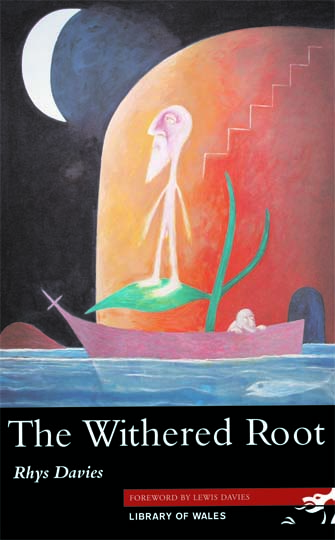

Contributed to
Story I (anthology) (Library of Wales, 2014)

About
Rhys Davies: A Writer's Life (by Meic Stephens; Parthian, 2013)
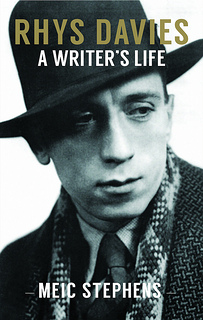
31 Stories in May at Hay!: Day 21 - 'Ward ‘O’ 3 (b)' by Alun Lewis
Every day throughout May, you will be able to visit the Library of Wales website to download your free story, drawn from Story, vols I and II - a collection boasting the finest Welsh short fiction ever written and featuring some of the most talented literary names from both past and present, including the legendary Dylan Thomas and the award-winning Rachel Trezise, as well as read all about the chosen author.
Day 21: 'Ward ‘O’ 3 (b)' by Alun Lewis
(Taken from In the Green Tree, 1948)

Alun Lewis was born on 1 July 1915 at Cwmaman, a mining village near Aberdare; both his parents were schoolteachers and his father later became the town’s Director of Education. The family took summer holidays at Penbryn in Cardiganshire, one of the poet’s favourite places. He was educated at Cowbridge Grammar School, the University College of Wales, Aberystwyth, where he read History, and at Manchester University. In 1938 he joined the staff of the Lewis Boys’ School, Pengam, enjoying a reputation as a gifted teacher, but in 1940, despite his pacifist convictions, resigned from the post and joined the Army as a commissioned officer. He found the life of the officers’ mess uncongenial, preferring the company of his men, most of whom were from the valleys of South Wales, but had time to resume the writing of poems and stories which he had begun while at school. In July 1941 he married Gweno Ellis, a teacher of German at Mountain Ash Grammar School. In the autumn of the following year his battalion of the South Wales Borderers was sent to India, where another period of intense literary activity began. The poverty and nihilism of India affected him deeply and he began to suffer bouts of the depression that had dogged him for several years. In January 1944 he went with his regiment to Chittagong in Burma. There, although an Intelligence Officer, he was given permission to move into a forward position facing the Japanese. On 5 March 1944 he was found shot in the head near the officers’ latrines; he died of his wounds six hours later. An Army court of inquiry concluded that his death was an accident, though the belief has persisted that he had taken his own life. Despite his comparatively small output – he published only ninety-four poems and twenty-five stories – Alun Lewis was recognized as an accomplished writer during his own short lifetime. Serious, idealistic, devoted to those he loved, particularly his wife, and intent on serving humanity as a writer, he was primarily concerned with what he called ‘the twin themes of life and death’, exploring them in verse and prose of a high order. His stories appeared in The Last Inspection (1943) and the posthumous volume In the Green Tree. His two collections of poems are Raiders’ Dawn (1942) and Ha! Ha! Among the Trumpets (1945); his Collected Poems (ed. Cary Archard) appeared in 1994 and a selection in the Corgi series in 2003. In everything he wrote there is compassion for the underdog, whether British soldier or Indian peasant, and a fine delight in the natural world, even in the parched landscapes of the sub-continent. His was a tragic vision, forced to early maturity by his military experience, and his death at the age of 28 was undoubtedly the single greatest loss sustained by Welsh letters during the Second World War.
You can download the story in PDF format here. (If download does not start, then right click the link and select 'Save link as'.)
Selected bibliography
In the Green Tree (Library of Wales, 2006)
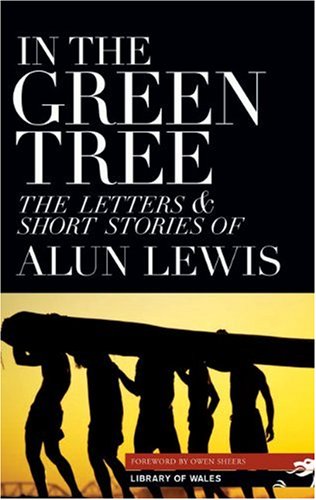
Contributed to
Story I (anthology) (Library of Wales, 2014)

31 Stories in May at Hay!: Day 20 - 'The Stars Above the City' by Lewis Davies
Every day throughout May, you will be able to visit the Library of Wales website to download your free story, drawn from Story, vols I and II - a collection boasting the finest Welsh short fiction ever written and featuring some of the most talented literary names from both past and present, including the legendary Dylan Thomas and the award-winning Rachel Trezise, as well as read all about the chosen author.
Day 20: 'The Stars Above the City' by Lewis Davies
(Taken from Love and Other Possibilities, 2008)

Born in 1967 in Penrhiwtyn, Lewis Davies is one of the founding partners of Parthian, as well as a successful author, poet, editor, playwright and essayist. The company was established in 1993 to publish his first novel Work, Sex and Rugby, and has now published over two hundred titles of which over 190 are still in print. Davies has been involved in the literary scene in Wales since 1990 and is the current commercial director of Parthian and the Library of Wales series.
Aside from Work, Sex and Rugby, which was a national winner in World Book Day's 'We Are What We Read' poll, his novels include Tree of Crows (1996) and My Piece of Happiness(1999), and he has also published a selection of literary essays - As I Was a Boy Fishing (2003) - and a critically acclaimed selection of stories Love and Other Possibilities(2008). His work has received numerous awards, including the Rhys Davies short story competition (for his 1999 short story 'Mr Roopratna's Chocolate') and the John Morgan writing award (for his 1997 travel book Freeways: a Journey West on Route 66). He has worked extensively in Welsh theatre and has had a number of plays professionally produced, including Sex and Power at the Beau Rivage (2003), a play about about the meeting of Rhys Davies and D. H. Lawrence in the French Mediterranean of Bandol, andFootball (2004). His work for younger readers includes Tai and the Tremorfa Troll, a series of children’s picture books available in both English and Welsh and developed with the illustrator Hayley Acreman.
You can download the story in PDF format here. (If download does not start, then right click the link and select 'Save link as'.)
Selected bibliography
Love and Other Possibilities (Parthian, 2008)
Football (Parthian, 2004)
As I Was a Boy Fishing: Selected Essays (Parthian, 2003)
My Piece of Happiness (Parthian, 1999)
Freeways: a Journey West on Route 66 (Parthian, 1997)
Tree of Crows (Parthian, 1996)
Work, Sex and Rugby (Parthian, 1993)
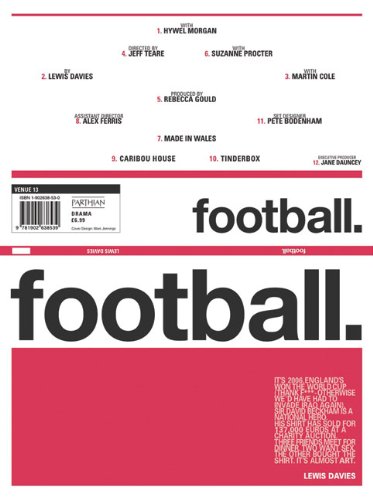
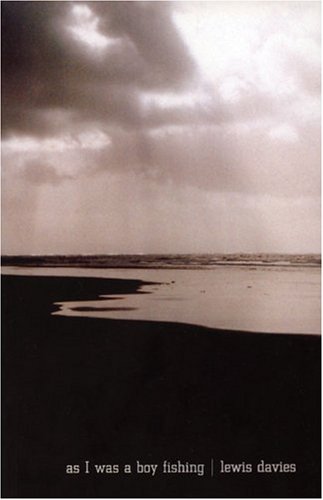
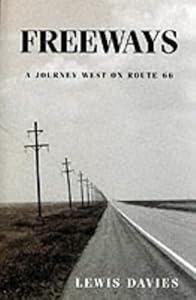

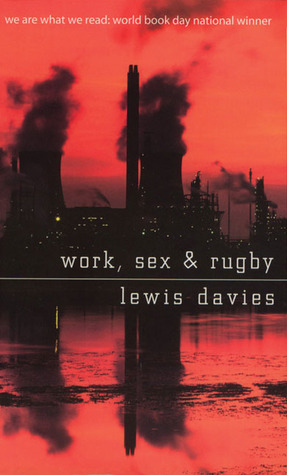
For children
Tai and Troll Take a Day-trip to Tenby / Tai a'r Trol yn Mynd am y Dydd i Ddinbych-y-Pysgod (Parthian, 2010)
Tai, Troll and the Black and White Cow / Tai, Trol a'r Fuwch Ddu a Gwyn (Parthian, 2009)
Tai and the Tremorfa Troll / Tai a'r Throl Tremofra (Parthian, 2007)

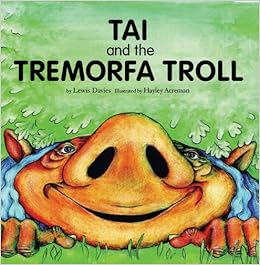
Plays
'Sickert, Supertramp and Jack the Ripper' (Equinox Theatre, Edinburgh Fringe Festival, 2010)
Contributed to
Story II (anthology) (Library of Wales, 2014)
Sport (Libray of Wales, 2007)
Urban Welsh: New Welsh Short Fiction (editor) (Parthian, 2005)
Human Conditions: Parthian New Writing (editor) (Parthian, 2001)
Mama’s Baby (Papa’s Maybe): New Welsh Short Fiction (New Welsh Short Fiction) (editor with Arthur Smith) (Parthian, 1999)



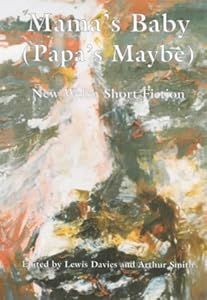
31 Stories in May at Hay!: Day 19 ‘Boys of Gold’ by George Brinley Evans
Every day throughout May, you will be able to visit the Library of Wales website to download your free story, drawn from Story, vols I and II - a collection boasting the finest Welsh short fiction ever written and featuring some of the most talented literary names from both past and present, including the legendary Dylan Thomas and the award-winning Rachel Trezise, as well as read all about the chosen author.
Day 19: 'Boys of Gold' by George Brinley Evans
(Taken from Boys of Gold, 2000)
George Brinley Evans was born in the mining village of Banwen, in Dyffryn Cellwen, in 1925. He began working in Banwen Colliery, the local Onllwyn coal mine, at the age of 14, in 1939. He joined the army at 18, during the Second World War serving in Burma with the 856 Motor Boats, first with the 15th India Corps then the 12th Army. He returned to work in Banwen Colliery mine after the War, married and raised a family before losing an eye in an accident in the Cornish Drift, when he had to leave mining. He began to produce work as a sculptor in addition to his painting after his accident and also wrote scripts for independent television and the BBC. He returned to industry and finally to opencast mining in 1977. His fiction, painting and sculptures have been widely published and exhibited. He published his first book, the short-story collection Boys of Gold, to critical acclaim in 2000, at the age of 77. His autobiography, Where the Flying Fishes Play, is a record of his time as a young man of eighteen, when he joined one of the last major campaigns of World War II. He still lives and works in Banwen, where he is involved in the local community and concentrate on his writing.
You can download the story in PDF format here. (If download does not start, then right click the link and select 'Save link as'.)
Selected bibliography
When I Came Home (Parthian, 2012)
Where the Flying Fishes Play (Parthian, 2006)
Boys of Gold (Parthian, 2000)



Contributed to
Story I (anthology) (Library of Wales, 2014)

31 Stories in May at Hay!: Day 18 ‘Old People are a Problem’ by Emyr Humphreys
Every day throughout May, you will be able to visit the Library of Wales website to download your free story, drawn from Story, vols I and II - a collection boasting the finest Welsh short fiction ever written and featuring some of the most talented literary names from both past and present, including the legendary Dylan Thomas and the award-winning Rachel Trezise, as well as read all about the chosen author.
Day 18: ‘Old People are a Problem' by Emyr Humphreys
(Taken from Old People are a Problem, 2003)

Emyr Humphreys, a former theatre and television director, drama producer and lecturer, in a long and illustrious career has written, both in Welsh and in English, twenty novels, several collection of short-stories and poetry, a cultural history of Wales, The Taliesin Tradition, and won several literary prizes during his career.
He was born in 1919 in Trelawnyd, in Flintshire and attended Rhyl High. Although an English-speaker, he learned Welsh after the burning of the bombing school on the Llyn peninsula in 1936, when his interest in Welsh culture was first awakened. He read history at the University of Wales, Aberystwyth, and at the outbreak of the Second World War he registered as a conscientious objector, working on a farm, and later doing relief work in Egypt and Italy. After the War he worked as a teacher and then joined the BBC as a drama producer in 1955. He moved to North West Wales in the mid 1960s and became a lecturer in drama at Bangor University, but left in 1972 to write full–time. His first novel, Little Kingdom, was published in 1946.
Among many honours, in 1958 Humphrey went on to win the Somerset Maugham Prize for Hear and Forgive (1952) and the Hawthornden Prize for A Toy Epic (1958) as well as the Wales Book of the Year award twice, in 1992 and 1999.
Other classics he wrote are Outside the House of Baal (1965) and The Land of the Living, an epic sequence of seven novels charting the political and cultural history of twentieth-century Wales: Flesh and Blood; The Best of Friends; Salt of the Earth; An Absolute Hero; Open Secrets; National Winner, and Bonds of Attachment. Humphrey has also written and directed many plays for stage and television, as well as produced a number of screenplays.
He now lives in Llanfairpwll on Anglesey and is still busy writing. He is included in the University of Wales Press’ Writers of Wales Series, and several books have been published discussing his work. In 1999 he published his Collected Poems, and his most recent novel, entitled The Woman at the Window (2009), was on the 2010 Wales Book of the Year Long List. Humphrey is a Fellow of the Welsh Academi.
You can download the story in PDF format here. (If download does not start, then right click the link and select 'Save link as'.)
Selected bibliography
A Man’s Estate (Library of Wales, 2006)

Contributed to
Story I (anthology) (Library of Wales, 2014)
Story II (anthology) (Library of Wales, 2014)
Poetry (Library of Wales, 2007)



31 Stories in May at Hay!: Day 17 ‘The Conquered’ by Dorothy Edwards
Every day throughout May, you will be able to visit the Library of Wales website to download your free story, drawn from Story, vols I and II - a collection boasting the finest Welsh short fiction ever written and featuring some of the most talented literary names from both past and present, including the legendary Dylan Thomas and the award-winning Rachel Trezise, as well as read all about the chosen author.
Day 17: ‘The Conquered' by Dorothy Edwards
(Taken from Rhapsody, 1927)

Dorothy Edwards was born in 1903 in Ogmore Vale, a small mining community in Mid Glamorgan. Her father, an ardent socialist and Independent Labour Party leader, was the local school headmaster. Like her father, she was politically active, working for socialist and Welsh nationalist causes, although she always wrote in English. After a scholarship to Howell's School for Girls, Llandaf, she took a degree at Cardiff University in Greek and Philosophy, but literature was her passion and soon after graduating her short stories began to appear in magazines and journals. These were collected in Rhapsody (1927), along with several previously unpublished stories written during the nine months Edwards spent in Vienna and Florence. Her novel Winter Sonata (1928) followed shortly afterwards. She spent the following years trying to supplement her mother’s meagre pension by writing stories and articles for magazines and newspapers, and doing some extra-mural teaching at Cardiff University, but she never undertook full-time employment. After a brief period spent living in London with acquaintances from the’ Bloomsbury circle, Edwards committed suicide on a Cardiff railway line in 1934. A note left in her pocket at the time of her death read: ‘I am killing myself because I have never sincerely loved any human being all my life. I have accepted kindness and friendship and even love without gratitude, and given nothing in return.'
You can download the story in PDF format here. (If download does not start, then right click the link and select 'Save link as'.)
Selected bibliography
Rhapsody (Library of Wales, 2007)

Contributed to
Story I (anthology) (Library of Wales, 2014)

31 Stories in May at Hay!: Day 16 ‘Muscles Come Easy’ by Aled Islwyn
Every day throughout May, you will be able to visit the Library of Wales website to download your free story, drawn from Story, vols I and II - a collection boasting the finest Welsh short fiction ever written and featuring some of the most talented literary names from both past and present, including the legendary Dylan Thomas and the award-winning Rachel Trezise, as well as read all about the chosen author.
Day 16: ‘Muscles Come Easy' by Aled Islwyn
(Taken from Out With It, 2008)

Aled Islwyn is a writer, editor and translator. He was born in 1953 in Port Talbot, moved around Wales during his childhood and graduated in Welsh at St. David’s College, Lampeter. He has lived and worked in Cardiff since the 1970s, and currently works as a Press Officer with S4C. He has written and published extensively in Welsh, and although he is mostly known for his novels, he has also published a volume of verse, Dyddiau Gerwyn (’The Days of Gerwyn’) (1977). His fiction is characterised by an emphasis on emotional concerns underlain by a sharp, lyrical intensity. He explores the interplay between individual and society, focusing on the psychology of identity and sexuality with great intensity and lyricism. He won the Daniel Owen Memorial Prize at the National Eisteddfod in 1980 and again in 1985. His collection of short stories, Unigolion, Unigeddau (1994) won the Welsh Book of the Year Prize in 1995. Out With It (2008) is his third collection of short stories, but his first in English.
You can download the story in PDF format here. (If download does not start, then right click the link and select 'Save link as'.)
Selected bibliography
Muscles Came Easy (Parthian, 2011)
Out With It (Parthian, 2008)


Contributed to
Story II (anthology) (Library of Wales, 2014)
A White Afternoon: Parthian Anthology of Welsh Short Stories (Parthian, 1999)


31 Stories in May at Hay!: Day 15 - ‘The Lost Fisherman’ by Margiad Evans





